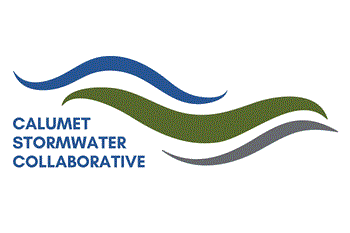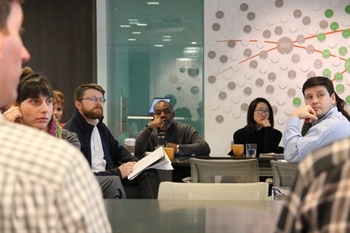Calumet Stormwater Collaborative

Calumet Stormwater Collaborative (CSC) is a diverse group of stakeholders working to improve coordination of knowledge, technology and financial resources to minimize the negative impacts of stormwater in the Calumet region. CSC is one of the priority projects of Calumet Collaborative (formerly the Millennium Reserve).
Background

Coordination between governments is a fundamental challenge to managing stormwater in any geography, be it a watershed or manmade sewershed. Government units have different regulatory and political pressures with varying financial and technical capacities—absent coordination, inconsistent goals, processes and investments will persist. Other non-government actors also manage land or financing tools, and are just as much a piece of the puzzle. In the Millennium Reserve area—Illinois’ portion of the Calumet Region and parts of the Illinois Lake Michigan coast—a new collaborative will provide the tools necessary to facilitate coordination.
Stormwater overwhelms current infrastructure;Stakeholders throughout the Millennium Reserve have identified a wide range of different stormwater management goals, strategies and tactics. The one universal and consistent desire has been for better communication and coordination. That is the core purpose of Calumet Stormwater Collaborative. The Collaborative addresses three central problems:
- Green infrastructure’s role in stormwater management is still taking shape; and
- Coordinated action between government units and other stakeholders controlling land, infrastructure, financing tools and regulatory powers is necessary to solve systemic problems in systemic ways.

Calumet Stormwater Collaborative, facilitated by Metropolitan Planning Council (MPC) and comprised of the key stakeholders controlling land, infrastructure, financing tools or regulatory powers related to stormwater (see list below), was selected as one of the priority projects by the Millennium Reserve Steering Committee. The initial purpose of the Collaborative is to foster awareness of the many ongoing stormwater management initiatives in the Calumet region, forge a shared understanding of terms, establish common goals and identify opportunities to align existing projects (or develop new ones) toward those goals. The purpose is not to slow individual projects, but to determine whether their outcomes can be leveraged to benefit others—all for the collective good. Additional interested parties are welcome to attend Collaborative meetings, and invited experts will frequently attend as resources.
At the outset, the Collaborative will define a specific geography, reach consensus on common goals, analyze what is currently impeding the region from reaching those goals and then develop a strategy and action plan to overcome those impediments. Additionally, early tasks for the Collaborative will include aiding the Ill. Environmental Protection Agency and Cook County in prioritizing a range of stormwater investments in the Calumet region, providing guidance to the Cook County Land Bank Authority on its role in stormwater management and scoping out a role for Chicago Metropolitan Agency for Planning’s Local Technical Assistance program. MPC will keep this process moving along by convening the Collaborative for meetings, information gathering, surveying and conversations. In time, the work of the Collaborative will improve stormwater management throughout the Calumet through coordinated, goal-driven planning and investment in both green and gray infrastructure.
Learn More
For more information, take a look at Calumet Stormwater Collaborative communications:
- Monthly meeting materials
- CSC Work Plan, 2022
- NOTE: CSC Steering Committee members met in November 2022 and agreed to extend the 2022 work plan into 2023. This group, guided by input from the broader CSC, will meet throughout 2023 to discuss goals, benchmarks, sector-specific strategies, key implementers and collaborations, and equity, among other topics germane to the work of the CSC and to future work planning.
- Three-Year Work Plan, 2018-2021
- One-page overview of CSC
- Brochure: How CSC members engage with communities
CSC Members (as of December 2021)
Government Agencies
Chicago Metropolitan Agency for Planning
Cook County Dept. of Environment and Sustainability
Cook County Dept. of Emergency Management and Regional Security
DuPage County
DuPage County Stormwater Management
Forest Preserves of Cook County
IDNR Coastal Management Program
Illinois Environmental Protection Agency
Metropolitan Water Reclamation District of Greater Chicago
National Fish and Wildlife Foundation
National Oceanic and Atmospheric Administration
Research Institutions
Barcelona Lab for Urban Environmental Justice
Illinois-Indiana Sea Grant
Illinois Institute of Technology
Purdue Extension
Purdue University
University of Illinois at Chicago
University of Illinois at Urbana-Champaign
University of Illinois Extension
University of Michigan
NGOs
Alliance for the Great Lakes
Anthropocene Alliance
Audubon Great Lakes
Calumet Collaborative
Center for Neighborhood Technology
Chicago Conservation Corps
CRTI at The Morton Arboretum
Daylight
Delta Institute
Emerald South Economic Development Collaborative
First Street Foundation
Foresight Design Initiative
Friends of the Chicago River
Greenleaf Communities
Healthy Schools Campaign
Metropolitan Planning Council
OAI
Openlands
Sierra Club Chicago
The Conservation Fund
The Nature Conservancy
The Trust for Public Land
Communities
Village of Calumet Park
Village of Midlothian
Private Companies
Antero Group
Baxter & Woodman
Brown & Caldwell
CERA Solutions
Christopher B. Burke Engineering
Environmental Design International
Farnsworth Group
Geosyntec Consultants
Grantify
Hey and Associates
Hyfi
Lewis & Associates
Metro Strategies
Mott MacDonald
Resource Environmental Solutions
Robinson Engineering
SmithGroup
SPAAN Tech
Sustainable Systems Consulting
Waterwell
Community Groups
Blacks in Green
Evanston Watershed Collective
Greenest Region Corps
Funders
Grand Victoria Foundation
